| Srl | Item |
| 1 |
ID:
091130
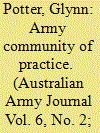

|
|
|
|
|
| Publication |
2009.
|
| Summary/Abstract |
In these times of economic frugality, the Army needs to consider all the avenues and opportunities available for the training and development of our soldiers and throw away some long held beliefs about how and by whom competence can be assessed and awarded. This article examines workplace learning and the contribution of Communities of Practice, Learning and Labour Networks to the gaining of knowledge, competence and expertise by our soldiers.
|
|
|
|
|
|
|
|
|
|
|
|
|
|
|
|
| 2 |
ID:
121679
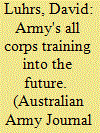

|
|
|
|
|
| Publication |
2012.
|
| Summary/Abstract |
T
he Australian Army currently conducts individual training for soldiers,
non-commissioned officers, warrant officers and officers in two forms: 'All
Corps Training' and 'Corps Specific Training'. As my authorities extend
only over the All Corps Soldier and Officer Training Continuums, it is there
that I will focus my encapsulation of that aspect of Army's professional military
education.
|
|
|
|
|
|
|
|
|
|
|
|
|
|
|
|
| 3 |
ID:
123939
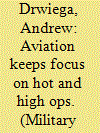

|
|
|
|
|
| Publication |
2013.
|
| Summary/Abstract |
The article reports on the Indian Air Force's (IAF) ways of dealing with hot and high environmental conditions. Hot and high refers to low air density caused by high temperatures and high geographic elevation which result in helicopters having difficulties generating lift. The IAF has started operating in such environments in 1984 when they launched an operation to secure the border in northern Kashmir. The IAF is reportedly planning to purchase the upgraded version of the Cheetah helicopter.
|
|
|
|
|
|
|
|
|
|
|
|
|
|
|
|
| 4 |
ID:
095290
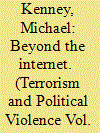

|
|
|
|
|
| Publication |
2010.
|
| Summary/Abstract |
This study challenges the conventional wisdom that the Internet is a reliable source of operational knowledge for terrorists, allowing them to train for terrorist attacks without access to real-world training camps and practical experience. The article distinguishes between abstract technical knowledge (what the Greeks called techne) and practical, experiential knowledge (mtis), investigating how each helps terrorists prepare for attacks. This distinction offers insight into how terrorists acquire the practical know-how they need to perform their activities as opposed to abstract know-what contained in bomb-making manuals. It also underscores the Internet's limitations as a source of operational knowledge for terrorists. While the Internet allows militants to share substantial techne, along with religious and ideological information, it is not particularly useful for disseminating the experiential and situational knowledge terrorists use to engage in acts of political violence. One likely reason why Al Qaeda and other Islamist terrorists have not made better use of the Internet's training potential to date is that its value as a source of operational knowledge of terrorism is limited.
|
|
|
|
|
|
|
|
|
|
|
|
|
|
|
|
| 5 |
ID:
062154
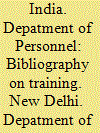

|
|
|
|
|
| Publication |
New Delhi, Depatment of Personnel, 1971.
|
| Description |
61p.
|
| Series |
Training monograph; no.11
|
|
|
|
|
|
|
|
|
|
|
|
Copies: C:1/I:0,R:0,Q:0
Circulation
| Accession# | Call# | Current Location | Status | Policy | Location |
| 008620 | 351.15/IND 008620 | Main | On Shelf | General | |
|
|
|
|
| 6 |
ID:
098750
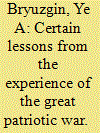

|
|
|
| 7 |
ID:
090450
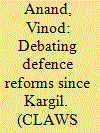

|
|
|
|
|
| Publication |
2009.
|
| Summary/Abstract |
In the light of the foregoing, it can be said that while a number of recommendations of the KRC report and GoM's report have been implemented, some of the key recommendations which would have improved joint ness and integration amongst the armed forces remain to be implemented in a meaningful manner.
|
|
|
|
|
|
|
|
|
|
|
|
|
|
|
|
| 8 |
ID:
100368
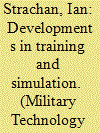

|
|
|
| 9 |
ID:
142336
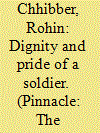

|
|
|
| 10 |
ID:
150023
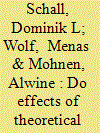

|
|
|
|
|
| Summary/Abstract |
Increasing energy efficiency is a cornerstone of policy initiatives to tackle climate change and increase corporate sustainability. Convincing people to drive more fuel-efficiently (“eco-driving”) is often an integral part of these approaches, especially in the transport sector. But there is a lack of studies on the long-term persistence and potential interaction of the effects of incentives and training on energy conservation behavior in general and eco-driving behavior in particular. We address this gap with a twelve months long natural field experiment in a logistics company to analyze the time-dependent and potentially interacting effects of rewards and theoretical training for eco-driving on fuel consumption in a real-world setting. We find an immediate reduction of fuel consumption following the introduction of a non-monetary reward and an attenuation of this effect over time. Theoretical eco-driving training shows no effect, neither short-term nor long-term, highlighting the often neglected necessity to include practical training elements. Contrary to common assumptions, the interaction of incentives and theoretical training does not show an additional reduction effect. Our results demonstrate the difficulty of changing engrained behavior and habits, and underline the need for a careful selection and combination of interventions. Policy implications for public and private actors are discussed.
|
|
|
|
|
|
|
|
|
|
|
|
|
|
|
|
| 11 |
ID:
156919
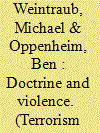

|
|
|
|
|
| Summary/Abstract |
Military theorists and practitioners have long argued that training shapes how combatants treat civilians during war. Yet there is little systematic evidence regarding the impact of training on wartime behavior, and almost none for non-state armed groups, despite the fact that such groups intensively train their fighters in order to shape their behavior towards civilian populations. This article argues that among insurgent groups that emphasize the strategic and tactical importance of restraint towards civilian populations, political training can reduce civilian killings. We test the observable implications of our theory in the case of Colombia, using survey data on former Revolutionary Armed Forces of Colombia (FARC) insurgents and sub-national data on civilian killings. We find support for our hypothesis, with results that are robust to a range of model specifications and controls, including alternate sources of combatant discipline and obedience, such as military training and punishment.
|
|
|
|
|
|
|
|
|
|
|
|
|
|
|
|
| 12 |
ID:
075137
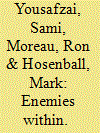

|
|
|
| 13 |
ID:
121922


|
|
|
| 14 |
ID:
150966
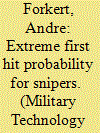

|
|
|
| 15 |
ID:
172165
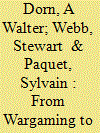

|
|
|
|
|
| Summary/Abstract |
Militaries around the world have benefited from computerized games. Many recruits have been attracted to the military through military-style video games. After recruitment, games and simulations provide an important means of soldier training, including before actual deployments. However, electronic games are lacking for UN peace operations. The multidimensionality of peacekeeping has yet to be simulated in serious games to complement the many games that too often depict a binary battlefield of blue-team versus red-team (or, often in public games, good versus evil). Not only could soldiers benefit from nuanced and ambitious peace-related games, so too could civilian peacekeepers, and the public at large. Peacekeeping gaming should not be merely at the tactical level; the operational and strategic levels can be gamed as well. The decision-making in future peacekeeping simulations could help instruct conflict-resolution and critical thinking skills. The paper posits that such digital games could be an important tool for current and future peacekeepers, both military and civilian. Commercial games could also help educate the public on UN peacekeeping. The paper suggests that the United Nations partner with some member states and perhaps the video game industry to provide in-depth training simulations that mirror the challenges and complexities of modern peace operations.
|
|
|
|
|
|
|
|
|
|
|
|
|
|
|
|
| 16 |
ID:
153997
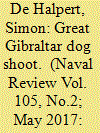

|
|
|
| 17 |
ID:
091124
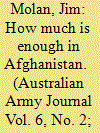

|
|
|
|
|
| Publication |
2009.
|
| Summary/Abstract |
The fight against the Taliban in Afghanistan has lasted for almost eight years now-longer than even the Second World War. The author argues that in this time, progress has been made, but that it has been made against a tide that now threatens to wash away the modest gains so bitterly made. Australian forces have been making gains in their sector, but with the Dutch contingent expected to leave sooner rather than later, the author insists that only a significantly increased Australian presence will help maintain the momentum towards success now slowly building. A surge now will give local Afghan forces the necessary breathing space within which they can be trained. If this training is conducted intelligently
and thoroughly, Afghan forces may reach a standard during this time such that Australian leaders could then seriously consider handing over responsibility for security. Ultimately, this could mean success, and a real chance to 'bring the diggers back home'.
|
|
|
|
|
|
|
|
|
|
|
|
|
|
|
|
| 18 |
ID:
127414
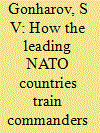

|
|
|
|
|
| Publication |
2013.
|
| Summary/Abstract |
The author discusses the principal areas, content, methods, and organization of commander training in the world's leading countries in managing subordinates' morale and psychology. He also addresses the requirements that apply to foreign military leaders' competence in psychology and pedagogy, and examines the ways in which they are applied in military educational institutions and in actual military service.
|
|
|
|
|
|
|
|
|
|
|
|
|
|
|
|
| 19 |
ID:
186817
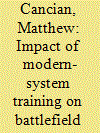

|
|
|
|
|
| Summary/Abstract |
What drives soldiers to risk death on the battlefield? Scholars have suggested that battlefield participation is driven by ideology, coercion, and cohesion while overlooking the importance of confidence in tactical success. On contemporary battlefields, training in effective, modern-system tactics will increase initial confidence and create a positive feedback loop of battlefield participation and combat effectiveness. I test this theory through the as-if random assignment of Peshmerga (Kurdish soldiers) to modern-system training by Western countries. One third of the Peshmerga had no formal training, one third had non–modern-system training from other Peshmerga, and one third had been trained in the modern-system. While non–modern-system training slightly increased unit confidence, it did not impact battlefield participation; coalition training in modern-system tactics dramatically increased confidence and, more importantly, led to higher levels of self-reported battlefield participation
|
|
|
|
|
|
|
|
|
|
|
|
|
|
|
|
| 20 |
ID:
169761
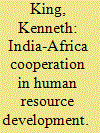

|
|
|
|
|
| Publication |
New Delhi, IDSA, 2019.
|
| Description |
46p.pbk
|
| Series |
IDSA Occasional Paper no; 51
|
| Standard Number |
9789382169833
|
|
|
|
|
|
|
|
|
|
|
|
Copies: C:2/I:0,R:0,Q:0
Circulation
| Accession# | Call# | Current Location | Status | Policy | Location |
| 059778 | 327.5406/KIN 059778 | Main | On Shelf | General | |
| 059779 | 327.5406/KIN 059779 | Main | On Shelf | General | |
|
|
|
|